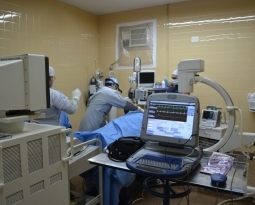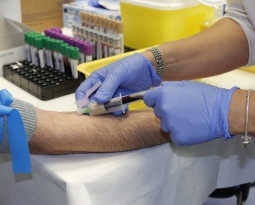North Carolina Patent of the Month – November 2021
In the human eye, the precorneal tear film – which covers ocular surfaces – is composed of three layers: the mucin layer, the aqueous layers, and the lipid layer. Each contributes to the protection and lubrication of the eye and therefore affects the dryness of the eye. Dry Eye Syndrome can lead to itching, burning, tearing, and irritation. The outermost layer of the eye – the lipid layer – is composed of lipids produced by meibomian glands in the eyelids. Since meibomian glands are responsible for the secretion of lipids which reduce the evaporation rate of the aqueous layer, it’s prudent to evaluate these glands as part of a dry eye diagnosis. TearScience, Inc. has designed an eyelid illumination system which allows a doctor to assess if there are any missing or damaged meibomian glands.
Their innovation is a meibomian gland imaging (MGI) device which uses infrared trans-illuminate , illuminating an eyelid and capturing images of the meibomian glands. The infrared light source is positioned outside the eyelid, as the eyelid is flipped downward. This allows images of the interior surface to be taken. The images show meibomian glands in dark outlined areas, while non-gland material is shown as light areas where the infrared light passes through. The doctor can then analyze these images to determine if meibomian glands are missing or if any appear damaged and use this to guid future treatment. TearScience, Inc. has been developing and manufacturing ophthalmic medical devices since 2005, working to improve the ability to assess and treat eye problems. With their MGI device, they can potentially help those with Dry Eye Syndrome, which affects as many as 25 million Americans.
Are you developing new technology for an existing application? Did you know your development work could be eligible for the R&D Tax Credit and you can receive up to 14% back on your expenses? Even if your development isn’t successful your work may still qualify for R&D credits (i.e. you don’t need to have a patent to qualify). To find out more, please contact a Swanson Reed R&D Specialist today or check out our free online eligibility test.
Who We Are:
Swanson Reed is one of the U.S.’ largest Specialist R&D tax advisory firms. We manage all facets of the R&D tax credit program, from claim preparation and audit compliance to claim disputes.
Swanson Reed regularly hosts free webinars and provides free IRS CE and CPE credits for CPAs. For more information please visit us at www.swansonreed.com/webinars or contact your usual Swanson Reed representative.

















